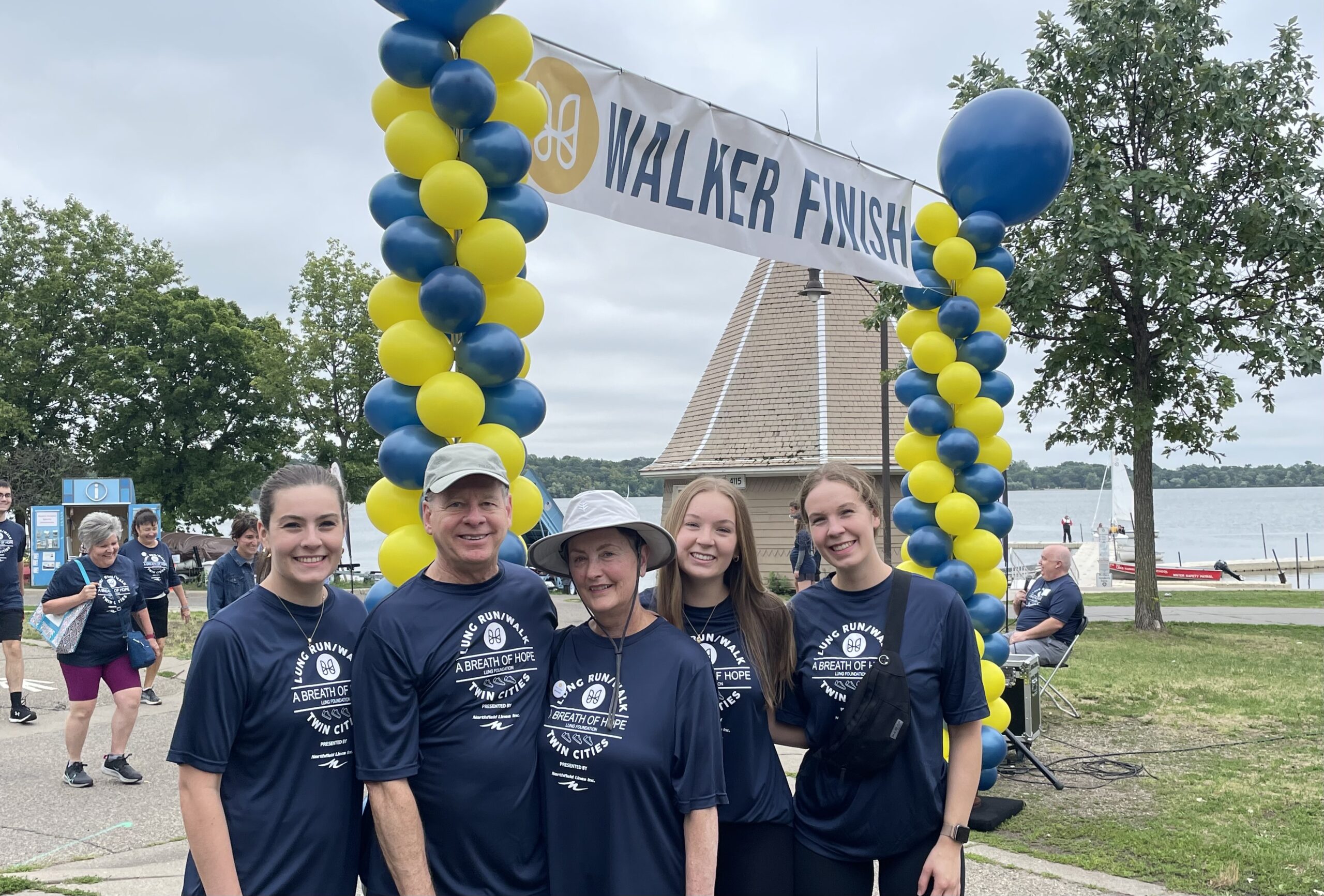Lung cancer claims more lives each year than breast and colon cancers combined, yet lung cancer receives disproportionately less research funding per cancer death than other types of cancer. A Breath of Hope knows that funding strong science and cutting-edge translational lung cancer research is vital to finding new treatments to save lives.
In honor of Peg, her ongoing fight to overcome lung cancer, and generous gifts from Peg and her husband, Jerry, A Breath of Hope announced the first 2021 Peg Fisher-Jullie Fight for Life Award, followed by the 2022 and 2023 Peg’s Fight for Life Research Awards!
Our deepest gratitude goes out to these selfless people who are making a difference in lung cancer research!
About Peg Fisher-Jullie:
 In 2017, Peg Fisher-Jullie developed an upper-respiratory infection right before taking a trip with her husband. To make sure that she was healthy before going overseas, she went to the doctor to rule out pneumonia. She had an x-ray that revealed no significant findings, got the ‘okay’ to travel, and went on her vacation. After returning from her trip, Peg continued to experience symptoms for more than three weeks and also noticed a little crackle in her lung when she lay on her right side. Initially, she ignored those symptoms, chalking it up to healing from the infection and the aging process. She was even able to continue working out!
In 2017, Peg Fisher-Jullie developed an upper-respiratory infection right before taking a trip with her husband. To make sure that she was healthy before going overseas, she went to the doctor to rule out pneumonia. She had an x-ray that revealed no significant findings, got the ‘okay’ to travel, and went on her vacation. After returning from her trip, Peg continued to experience symptoms for more than three weeks and also noticed a little crackle in her lung when she lay on her right side. Initially, she ignored those symptoms, chalking it up to healing from the infection and the aging process. She was even able to continue working out!
Shortly after turning 65 in 2018, Peg was scheduled for her first wellness physical and happened to mention to her primary care physician (PCP) that she was still having some respiratory symptoms. Her PCP insisted on an x-ray. The x-ray showed a cloudy nodule on her lung, but it was nonspecific.
Peg’s doctor did not waste any time. A CT Scan was ordered and Peg was referred to a pulmonologist. She was glad her doctor was being thorough and using an abundance of caution, but the thought of lung cancer never occurred to her. When the specialist said it was lung cancer, Peg remembers saying, “That can’t be.”
Peg received a biopsy that confirmed Stage 1B non-small cell lung cancer in her right lung. Peg and her husband traveled to Mayo Clinic for a second opinion. Her doctor recommended a lobectomy to remove the upper lobe of her right lung. In September of 2018, Peg had her lobectomy and thought that would be the end of it.
Unfortunately, in December of 2019, a routine scan showed a nodule on her left lung and tiny nodules on her right lung. At that time, her doctor ordered genetic testing and tumor genotyping on the original nodule that had been removed the year before. Peg underwent her second biopsy in January 2020. Results showed that this was the same cancer as the right lung. Because the cancer had metastasized, her diagnosis was now stage 4 lung cancer.
“I have always been someone that likes control,” said Peg. “Cancer has turned my world upside down because it’s something I don’t have control over.”
Comprehensive biomarker testing is used among diagnosed advanced-stage lung cancer patients to determine the presence of mutations or a specific protein. It is the first step in precision medicine and leads patients to the optimal treatment for their particular case. Peg’s test revealed the presence of an uncommon epidermal growth factor receptor (EGFR), which made targeted therapies available to her. Based on this uncommon EGFR mutation, she started Afatinib (Gilotrf®) in January 2020. Although the drug was working, the toxicity was affecting her quality of life, so in March of 2020, Peg began another targeted therapy, Osimertinib (Tagrisso®), and has since seen a reduction in her tumors. Tagrisso belongs to a class of drugs known as kinase inhibitors. It works by slowing or stopping the growth of cancer cells.
Peg found A Breath of Hope Lung Foundation in 2019 when she was still stage 1. She and her family participated in the Lung Run/Walk Twin Cities’ fundraising efforts. After being diagnosed for a second time at stage 4, she sat down with her husband to talk about how they could make a bigger impact on the lung cancer field.
Lung cancer research receives less funding than many other cancers, yet lung cancer patients like Peg depend on this research to develop the new therapies that keep them alive.
“I want to be sure that there is a next line of treatment available for me and for all those that are also fighting this disease.”
Peg and her husband, Jerry, decided that funding ABOH Named Research Awards was the best way to make a difference and ensure that top U.S. lung cancer research projects tied to the EGFR mutation receive the dollars it needs. Funding science that leads to new therapies and a better understanding of resistance mechanisms is essential for improving outcomes.
- 2021: Learn more about the 2021 winner of the Peg Fisher-Jullie Fight for Life Research Award: Dr. Kipp Weiskopf from the Whitehead Institute for Biomedical Research in Cambridge, Massachusetts.
- 2022: Learn more about the 2022 winner of Peg’s Fight for Life Award: Dr. Jaime Schneider from Harvard’s Massachusetts Hospital.
- Learn more about A Breath of Hope Lung Foundation’s research program.
- Learn more about ‘Named Research Awards’ by emailing

